Brian Carter, Peter Mills, Andie Parry, Amin Soltani, Annika Ganzeveld, Johanna Moore, and Nicholas Carl
The Iran Update provides insights into Iranian and Iranian-sponsored activities abroad that undermine regional stability and threaten US forces and interests. It also covers events and trends that affect the stability and decision-making of the Iranian regime. The Critical Threats Project (CTP) at the American Enterprise Institute and the Institute for the Study of War (ISW) provides these updates regularly based on regional events. For more on developments and in Iran and the region, see our interactive map of Iran and the Middle East.
Note: CTP and ISW have refocused the update to cover the Israel-Hamas war. The new sections address developments in the Gaza Strip, the West Bank, Lebanon, and Syria, as well as noteworthy activity from Iran’s Axis of Resistance. We do not report in detail on war crimes because these activities are well-covered in Western media and do not directly affect the military operations we are assessing and forecasting. We utterly condemn violations of the laws of armed conflict, Geneva Conventions, and humanity even though we do not describe them in these reports.
Key Takeaways:
- Hamas and its allies are preparing the information environment to blame Israel for the possible deaths of hostages in the Gaza Strip, especially if Hamas begins killing hostages. Palestinian militias continued attacks at their usual rate from the Gaza Strip into Israel.
- Clashes between Palestinian militants and Israeli forces have decreased significantly in the West Bank. Hamas has repeatedly tried to incite violence against Israel in the West Bank since the war began.
- Iranian-backed militants, including Lebanese Hezbollah (LH), conducted six attacks as part of an ongoing attack campaign targeting IDF radar and sensor sites and military targets. These attacks are consistent with Western and Israeli reports that LH is trying to “keep Israeli forces busy.”
- The Islamic Resistance of Iraq—a coalition of Iranian-backed Iraqi militias—has claimed daily attacks on US bases in Iraq and Syria since October 18. These attacks are part of the Iranian-led effort to deter the United States from providing meaningful support to Israel.
- Iranian-backed Iraqi militia Alwiya Waad al Haq (the Righteous Promise Brigades) threatened to attack US forces in Kuwait and the United Arab Emirates.
- Iran is setting informational conditions to blame the United States and Israel for any further escalation of the war and deflect any responsibility from itself. This narrative that Iran is pushing ignores the fact that Iran has already facilitated the expansion of this war to Lebanon, Iraq, Syria, and Yemen by directing its proxy and partner militias in these countries to attack US and Israeli targets.
Gaza Strip
Hamas and its allies are preparing the information environment to blame Israel for the possible deaths of hostages in the Gaza Strip, especially if Hamas begins killing hostages. Hamas military spokesperson Abu Ubaida said on October 9 that Hamas would kill hostages in response to Israeli airstrikes, indicating Hamas’ willingness to do so for perceived military and/or political gains.[1] Tasnim News Agency—an Iranian outlet affiliated with the Islamic Revolutionary Guard Corps (IRGC)—reported on October 22 that Israel’s “clandestine goal” is to “cause the killing of captive Israelis,” according to “informed sources.[2] Palestinian Islamic Jihad (PIJ) spokesperson Abu Hamza said on October 24 that Israel does not “pay attention” to the lives of hostages.[3]
Hamas and allied Palestinian militias took hostages during the October 7 attack likely to discourage an Israeli ground operation into the Gaza Strip and/or to secure concessions of some kind. Israeli actions and rhetoric suggest that Hamas and allied militias will fail to generate those desired effects, however. Israel is continuing to prepare for a possible ground operation into the Gaza Strip, and the Wall Street Journal reported that Israel-Hamas hostage negotiations collapsed after Hamas demanded that Israel allow fuel deliveries into the Gaza Strip.[4] The Israel Defense Forces (IDF) spokesperson said that fuel will not enter the strip because Hamas uses fuel for its military infrastructure.[5] Israeli sources said that Israel estimates that Hamas and allied militias are low on fuel and will need to leave their tunnel networks underneath the Gaza Strip once their fuel is depleted.[6]
Recorded reports of rocket attacks; CTP-ISW cannot independently verify impact.
Palestinian militias continued attacks at their usual rate from the Gaza Strip into Israel on October 24. The al Qassem Brigades—Hamas’ militant wing—claimed responsibility for 11 indirect fire attacks.[7] Saraya al Quds—the militant wing of PIJ—claimed responsibility for six mortar and rocket attacks.[8] The al Aqsa Martyrs’ Brigade—the militant wing of Fatah—claimed responsibility for two rocket attacks.[9] The Abu Ali Mustafa Brigades—the militant wing of Popular Front for the Liberation of Palestine (PFLP)—claimed responsibility for three mortar attacks.[10] Axis of Resistance-affiliated media and IDF outlets reported two other unclaimed rocket attacks.[11] This rate of attacks is consistent with the rate that CTP-ISW has observed in recent days.
CTP-ISW recorded one infiltration attempt from the Gaza Strip into Israel on October 24. IDF naval elements targeted a cell of Hamas divers attempting to infiltrate Israel near Zikim.[12] The al Qassem Brigades claimed that its forces clashed with the IDF near Zikim after the attempted infiltration.[13] Other Palestinian sources said that fifteen Hamas fighters infiltrated into the Zikim naval base, where they clashed with the IDF.[14] The IDF wounded six Hamas fighters, according to Palestinian media.[15]
Recorded reports of rocket attacks; CTP-ISW cannot independently verify impact.
West Bank
Clashes between Palestinian militants and Israeli forces have decreased significantly in the West Bank on October 24. CTP-ISW recorded three clashes on October 24 compared to nine on October 23.[16] CTP-ISW also recorded one demonstration in Tulkram in solidarity with the Gaza Strip.[17] Hamas has repeatedly tried to incite violence against Israel in the West Bank since the war began.[18]
- The al Aqsa Martyrs’ Brigade claimed responsibility for an ambush targeting the IDF in Burqa, Nablus.[19] Militants lured the IDF before throwing an IED and opening fire at them. Israeli media reported that one IDF soldier was wounded in the fighting.[20]
- The Jabaa Battalion—a component of PIJ’s al Quds Brigades—claimed responsibility for shooting down an Israeli drone in Jaba, Jerusalem. LH-controlled al Manar reported that Jabaa Battalion militants shot down the drone while engaging IDF soldiers in small arms combat.[21]
- The Nablus Brigade—a unit of PIJ’s al Quds Brigades—reported that it attacked at least one IDF patrol in Nablus.[22]
This map is not an exhaustive depiction of clashes and demonstrations in the West Bank.
Southern Lebanon and Golan Heights
Iranian-backed militants, including Lebanese Hezbollah (LH), conducted six attacks as part of an ongoing attack campaign targeting IDF radar and sensor sites and military targets.[23] LH claimed two anti-tank guided munition (ATGM) attacks on IDF positions along the northern Israeli border.[24] LH also released a compilation video of previous attacks on IDF radar and sensor sites.[25] LH has continued to suffer casualties in the fighting around the border as the IDF targets ATGM squads preparing to fire into Israel.[26] An LH-affiliated journalist claimed that the group intends to destroy the IDF’s ”espionage capacity” and limit all mechanical and personnel movement along the border through these attacks.[27] These attacks are consistent with Western and Israeli reports that LH is trying to “keep Israeli forces busy.”[28] This campaign also creates opportunities for further LH attacks into Israel and increases the risk of further escalation, as CTP-ISW previously noted.[29]
Unidentified militants in southwestern Syria launched two rockets into the Golan Heights on October 24.[30] CTP-ISW has recorded five attacks into the Golan Heights from Syria since the war began.[31] This most recent attack is inconsistent with the attack pattern that CTP-ISW has observed during the war so far. Unidentified militants have only fired into the Golan Heights from Syria after Israeli airstrikes on Syrian airports up until this point.[32] The IDF has conducted five airstrikes on the Damascus and Aleppo international airports since October 7 to disrupt possible Iranian efforts to transfer military equipment and personnel to Syria.[33]
LH and Lebanese government officials have opposing messages about the possibility of the war expanding to Lebanon. The Lebanese prime minister and Lebanese army commander visited southern Lebanon on October 24 to discuss de-escalating and restoring stability with United Nations Interim Force in Lebanon (UNIFL) leaders.[34] The Lebanese Army commander stated the Lebanese army is following developments and maintaining readiness at the southern border, while the Lebanese prime minister called Lebanon a peace-loving country. The Lebanese prime minister and the army commander do not control LH forces in southern Lebanon and cannot meaningfully enforce de-escalation, however. LH Deputy Secretary General Naim Qassem warned on October 24 that LH is at the heart of the battle to defend the Gaza Strip and that the group’s “hand is on the trigger.”[35]
Iran and Axis of Resistance
The Islamic Resistance of Iraq—a coalition of Iranian-backed Iraqi militias—has claimed daily attacks on US bases in Iraq and Syria since October 18. The group has claimed 15 drone and rocket attacks in this time. The group continues to expand the location of its attacks against US forces in Syria. These attacks are part of the Iranian-led effort to deter the United States from providing meaningful support to Israel, as CTP-ISW previously assessed.[36]
- The Islamic Resistance in Iraq claimed that it used drones to attack US forces at al Omar and al Shaddadi in eastern and northeastern Syria respectively on October 23.[37] The group claimed the drones “hit their target”. The group has not previously claimed attacks on US forces in al Omar and al Shaddadi.
- The Islamic Resistance in Iraq claimed that it fired two rockets at US forces in Ain al Asad airbase in Iraq on October 24.[38] The group released a video showing the rocket launch but did not include footage of any impact.[39] The Islamic Resistance in Iraq has claimed five attacks on US forces at Ain al Asad airbase since October 18. The leader of the Iranian-backed militia Harakat Hezbollah al Nujaba condemned the Iraqi government over its refusal to expel US forces from Iraq on October 24.[40] Nujaba previously threatened to attack US forces in Iraq in May 2023.[41] London-based, Qatar-funded al Araby al Jadeed reported that Iraqi Prime Minister Mohammad Shia al Sudani met with the heads of Iranian-backed proxies in Iraq in an effort to deescalate with US forces in Iraq.[42] Nujaba and another Iranian-backed Iraqi militia, Kataib Hezbollah, refused to meet with Sudani and rejected calls for de-escalation.[43]
Iranian-backed Iraqi militia Alwiya Waad al Haq (the Righteous Promise Brigades) threatened to attack US forces in Kuwait and the United Arab Emirates on October 24.[44] Alwiya Waad al Haq previously claimed drone attacks targeting the Saudi royal palace in January 2021 and ”vital facilities” in Abu Dhabi, United Arab Emirates in February 2022.[45] CTP-ISW previously assessed that this group was likely a front for Kataib Hezbollah.[46] Pro-Iran Telegram channels affiliated with Iraqi proxy groups echoed the group’s threat to attack US forces in Kuwait and the United Arab Emirates.[47] This threat and its amplification in pro-Iran channels suggest that Iranian-backed Iraqi militias are willing to escalate regionally beyond Iraq and Syria.
Iran is setting informational conditions to blame the United States and Israel for any further escalation of the war and deflect any responsibility from itself. Supreme Leader Ali Khamenei’s official website accused Israel of trying to ignite “a direct war against Iran with US support.”[48] Foreign Affairs Ministry spokesperson Nasser Kanani stated on October 24 that Iran is seeking to preserve regional “stability and security” despite “war-mongering” from the United States and its allies.[49] IRGC-affiliated Fars News Agency argued on October 24 that Axis of Resistance attacks on American bases in Iraq and Syria are only meant to deter further American involvement in the Israel-Hamas war.[50] Nine unspecified Iranian officials told the Qatari-owned, London-based al Araby al Jadeed that Iran only supports “limited” and “small-scale” militia attacks on Israel and US positions in the region but would not seek to open a ”major new front in the war” on October 24.[51] Iran’s Ambassador to Russia Kazem Jalali lastly stated that the responsibility for ”any escalation” of the conflict would fall on the United States and Israel during an interview with Russian state media on October 24.
This information operation that the Iranian regime is conducting is meant to frame the United States and Israel as the antagonists in the war and especially in the event that it escalates further. This information operation also frames the regime as responsible and non-escalatory to its population. This narrative that Iran is pushing ignores the fact that Iran has already facilitated the expansion of this war to Lebanon, Iraq, Syria, and Yemen by directing its proxy and partner militias in these countries to attack US and Israeli targets.
Iranian state media is seizing on Israeli and Western reports of divisions between Israeli Prime Minister Benjamin Netanyahu and IDF generals and between Israel and the United States to revive pre-war narratives about Netanyahu’s and Israel’s isolation and weakness. State-run outlet IRNA recirculated Israeli reporting on October 23 about “disagreements” between Netanyahu and the IDF and about Israel’s “inability to decide” on a ground operation into the Gaza Strip.[52] IRNA’s framing of the disagreements differs from the original Israeli reporting that noted that the Israeli war cabinet and senior Israeli military officials disagree on the “timing and scope” of a ground operation—not on whether to conduct such an operation in the first place.[53] Iranian officials and media repeatedly claimed throughout 2023 that Israel was at its “weakest point” due to protests over Netanyahu’s proposed judicial reforms and internal political fissures.[54] Supreme Leader Ali Khamenei stated in April 2023, for example, that Israel was in its worst position and “in a hurry” to collapse.[55]
IRNA separately recirculated Israeli and American reporting on October 24 that some US officials doubt the IDF’s readiness to conduct a ground operation into the Gaza Strip.[56] The regime’s emphasis on disharmony between Israel and the United States contrasts with its emphasis on Muslim unity against Israel. Tehran has historically—and particularly since the start of the war on October 7—sought to rally Muslim countries against Israel and frame itself as a champion of the Palestinian cause, as CTP-ISW previously reported.[57]
Iranian media exaggerated the scope and losses of the IDF’s October 22 raid on Khan Younis as part of its ongoing efforts to deter an Israeli ground operation into the Gaza Strip. Israel conducted a limited raid on Khan Younis to gather information about Israeli hostages and to prepare for a ground operation into the Gaza Strip.[58] The IDF announced that one Israeli soldier was killed during the raid but did not acknowledge Hamas’ claim that it had destroyed Israeli military equipment.[59] State-controlled, English-language Press TV claimed on October 23 that Hamas forced 20 Israeli tanks to retreat during the clashes at Khan Younis.[60] Press TV also claimed that Israeli forces were “caught in an ambush” near Rafah on October 22, which forced them to abandon 10 tanks. IRGC Deputy Commander Brigadier General Ali Fadavi similarly referred to the Khan Younis raid when warning Israel on October 23 that a ground operation into the Gaza Strip would precipitate a “regrettable answer from” the Axis of Resistance. Iranian media and officials’ framing of the Khan Younis raid as a defeat for Israel is consistent with previous Iranian rhetoric that the IDF will face “significant challenges” if it launches a ground operation.[61]
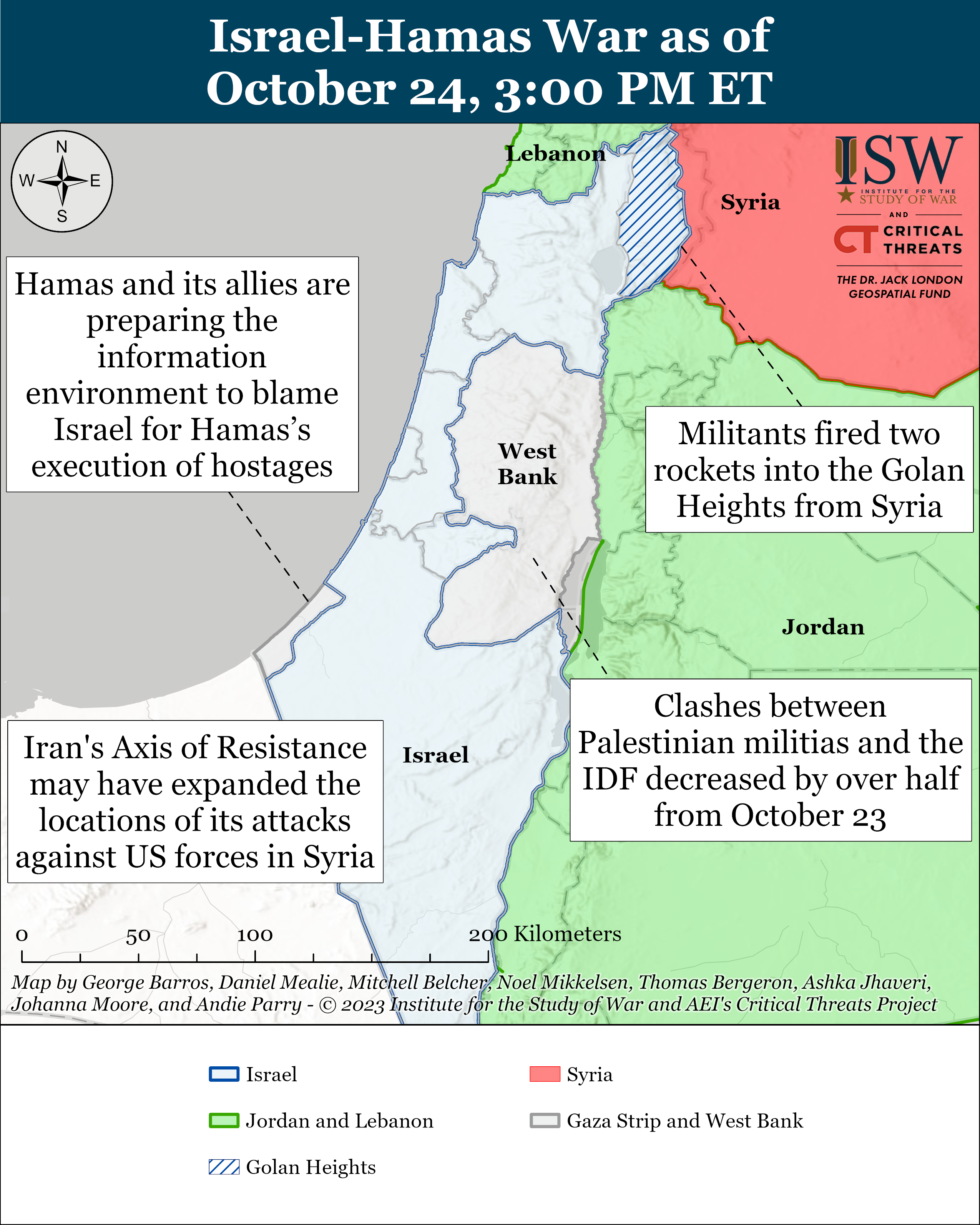
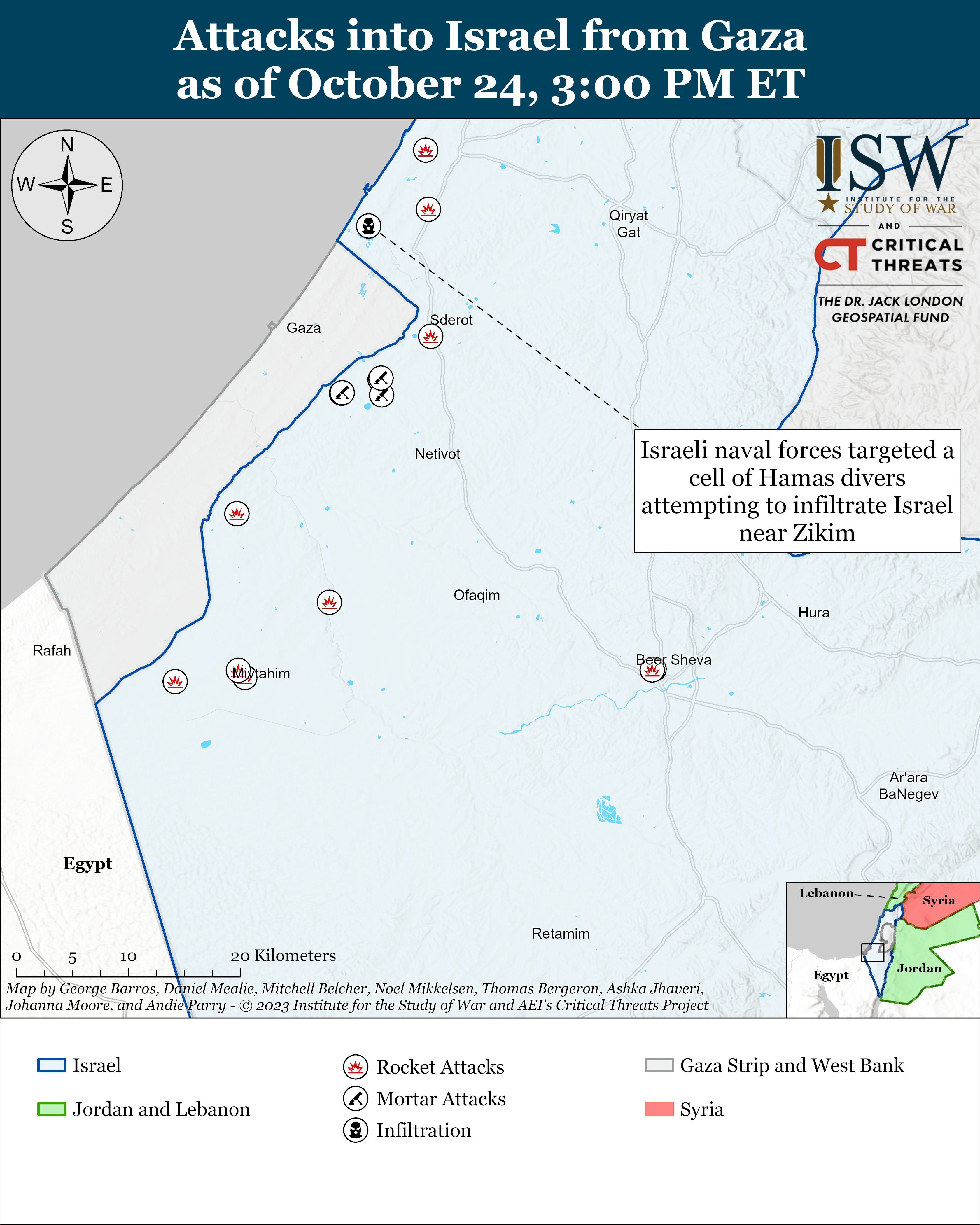
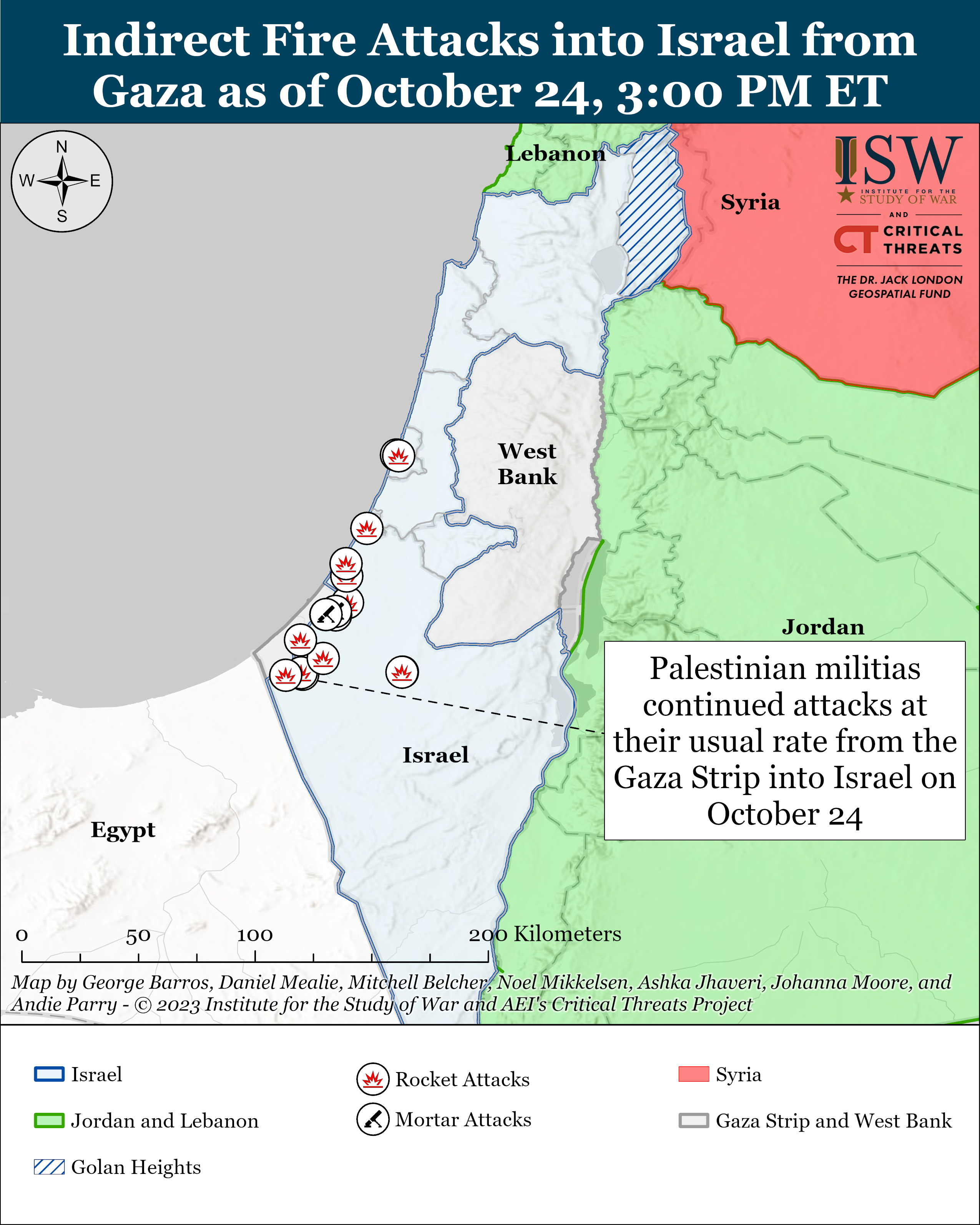
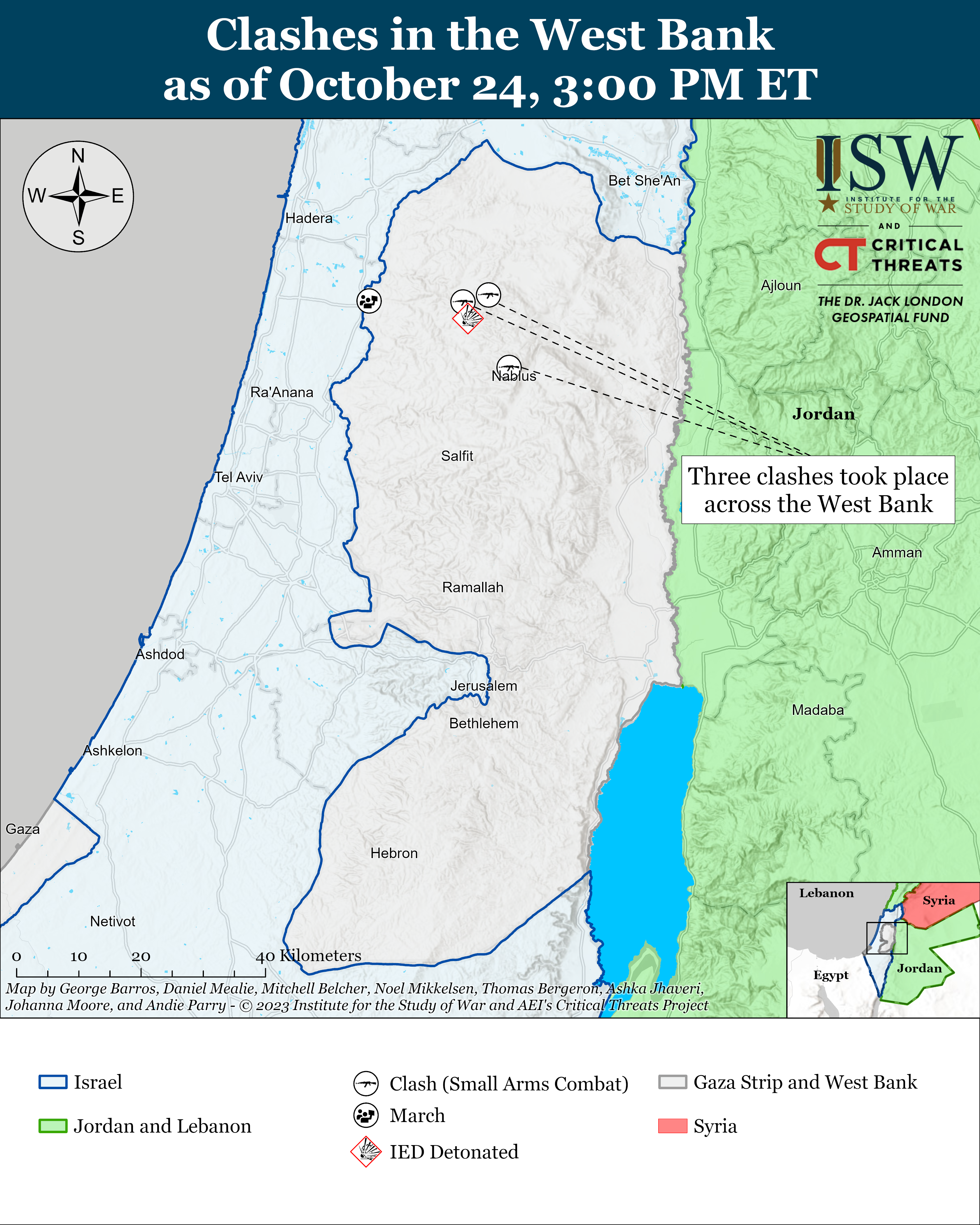
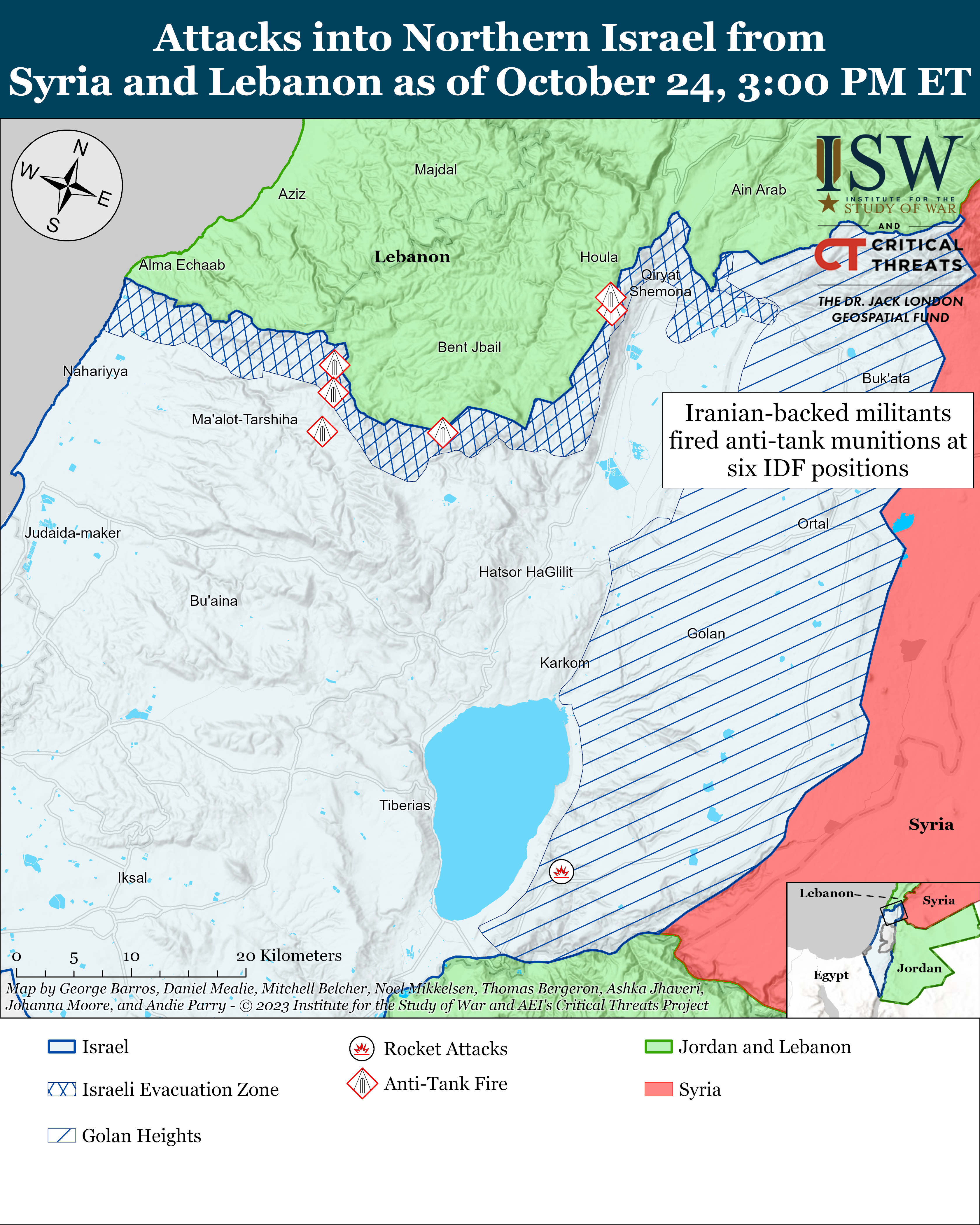
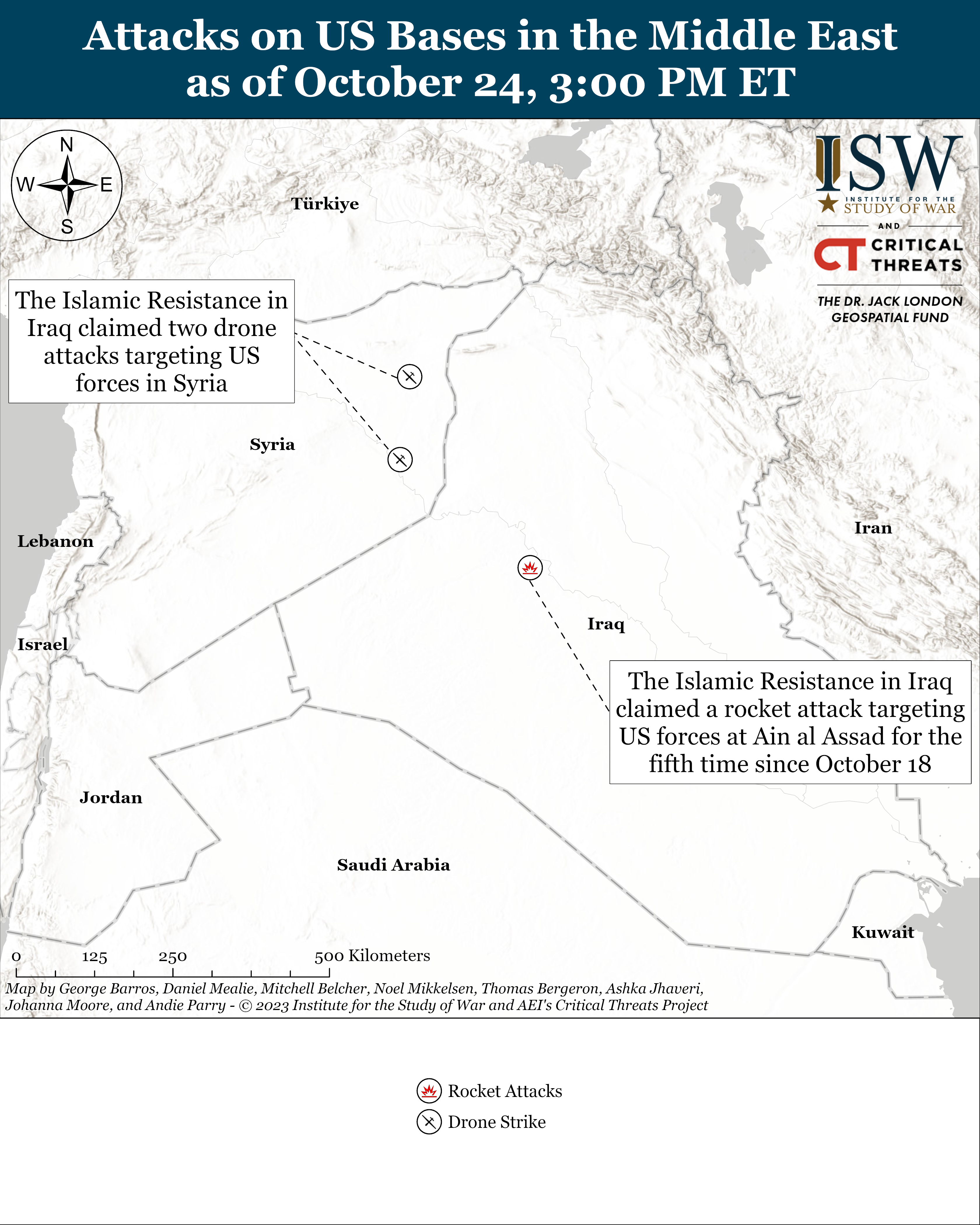
No comments:
Post a Comment